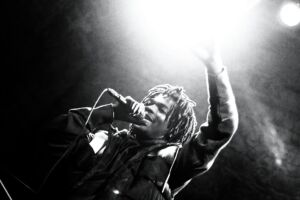Business & Education
Ugandan political rapper, Obama Foundation leader and NGO manager: Richard Walakira carves his own path in Denmark
This article is more than 2 years old.
Richard Walakira has woven together many paths in politics, business and music on his journey from Uganda to Denmark. His maxim? “No matter how old you are, never forget to show off your coolness.”

Photo: One Blood Project
Ugandan-born Richard Walakira works as a Program Manager at the Alliance of Democracies Foundation, a non-profit organisation established in 2017 by Anders Fogh Rasmussen, the former NATO Secretary General and Prime Minister of Denmark.
Walakira is responsible for fundraising and overseeing the foundation’s initiatives on advancing tech for democracy, including the Democracy Tech Hackathons and the Democracy Tech Entrepreneur Fellowship Program.
He is also a member of a community in Copenhagen called the Brotherhood for Professional Men of Colour (BPoC) – a new network for men of an ethnic heritage other than Danish.
But he has trodden another parallel path, travelling the world as a political rapper by his artist name Bana Mutibwa: “I hail from the Buganda kingdom in Uganda, and my primary language is Luganda. I am a proud Muganda, yearning for a name that reflects that heritage. I wanted to infuse my name with Luganda authenticity,” he says.
How did Walakira weave these paths – from Uganda to Denmark, spanning music, politics and business – together? Here, he shares his journey.
Music and growing up in Uganda
Growing up in Uganda, Walakira had an exuberant passion for football. Though he admits he wasn’t the most gifted on the field, he was always the youngest, and gave it his all.
In the classroom, he had no trust in the education system. “I had no support network of Ugandan elites to allow me to thrive post-education. So, I dropped out of high school and found refuge in writing and performing hip-hop music,” he says.
One Tuesday night back in January 2009, Walakira helped to organise an event called ‘Spoken Truth’. It was the night that Barack Obama took the oath to become President of the United States. He recalls the silence that spread across the venue, which was full of local hip-hop artists, as they watched. “To us in Uganda, Obama was also Kenyan,” he says.
Kenya and Uganda are neighbouring countries in East Africa that share a border along their western boundary. The silence Walakira experienced that night inspired an artistic shift. He was already rapping under the name Bana Mutibwa – but now his focus moved from self-expression to uplifting the voices of his community, and he began to take a deeper interest in politics.
In April 2011, Bana composed the song ‘Walk to Work’ in support of the peaceful ‘Walk to Work’ movement led by opposition leader Kizza Besigye, inspired by Ugandans protesting disputed elections and rising costs during a period of security crackdowns and demonstrations.
Following his 2012 debut CD ‘Uganda Passport the Mixtape’, he cemented his genre and travelled the world as a political rapper.
Education, politics and identity in Denmark
In December 2014, Walakira moved to Aarhus, Denmark, fulfilling a dream to move to a country offering free education.
“I quickly realised that I needed an education to continue my fight for democracy and freedom as a profession,” he says.

Walakira enrolled at Langkær Gymnasium in the summer of 2015 as part of the International Baccalaureate Diploma Programme. He was part of the first batch of students to have studied global politics as part of the diploma.
In Uganda, Walakira had always been the youngest; in Denmark, he was the oldest on the course. But he persevered, and went on to study a Bachelor’s in International Business and Politics at Copenhagen Business School (CBS).
Post-graduation, Walakira joined the Alliance of Democracies Foundation as a junior analyst, which he calls ‘a fancy term for an intern’. During the summer of 2020, he was tasked with developing a project at the crossroads of democracy, technology, and entrepreneurship. The small wage which came with the position was the main attraction. “Unpaid internships deepen the existing social divide,” he says.
The project that Walakira developed as an intern is his job today. The Democracy Tech Entrepreneur Fellowship selects participants from Ukraine, Georgia, Moldova, and Armenia to empower innovators.
The program consists of two phases, with the first involving masterclasses and mentor sessions, and the second phase bringing fellows to Copenhagen for networking, mentor meetings, pitching to investors, and further support.
Selected as a Obama Foundation Global Leader
Richard was accepted into the Obama Foundation Leaders program earlier in the year. In his application, he highlighted his work in supporting tech entrepreneurs with solutions to democracies’ problems, at the Alliance of Democracies Foundation.
But that wasn’t all: he also pointed to his political activism in Uganda, using hip-hop music for positive social change for over a period of ten years. Though he is based in Denmark, the spirit of Bana Mutibwa the political rapper, is alive and well.
“I am thrilled to be joining the global network of Obama leaders. It’s an honour to be part of the Leader Europe cohort”, Richard wrote on LinkedIn.
And now, Bana Mutibwa is back in the studio. His new album is called Essays of a Revolutionary MC and it is scheduled to release in February next year.
Walakira makes these interwoven journeys look natural: “No matter how old you are, never forget to show off your coolness. That is key to the politics of pleasure,” he says.
Listen to Bana Mutibwa’s political raps on Spotify










































